|
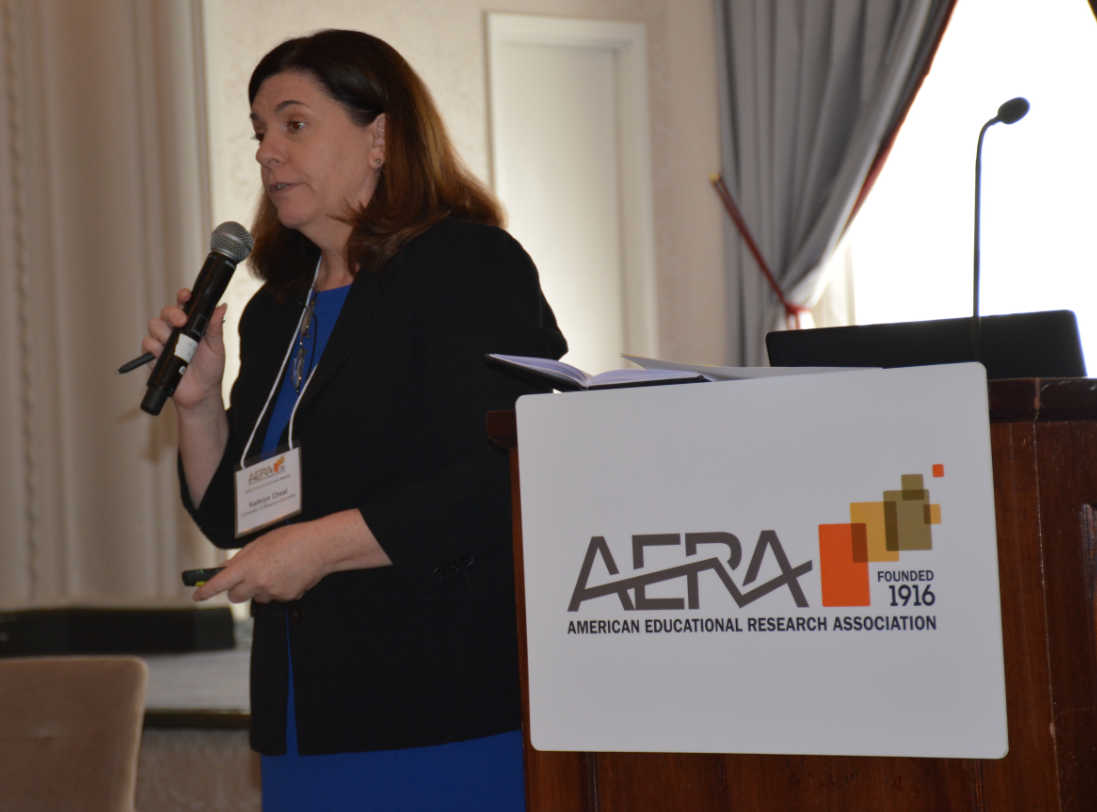
AERA-CURI Executive Committee
Chair Kathryn Chval
(University of Missouri)
|
September 2019
On September 17–18, 60 deans and associate deans at colleges of education and leaders at research institutions attended the Fall Policy Meeting of the AERA Consortium of University and Research Institutions (AERA-CURI) in Washington, D.C. The theme of this year’s AERA-CURI Fall Policy meeting was “Strengthening Strategies and Climates to Advance Education Research.”
|
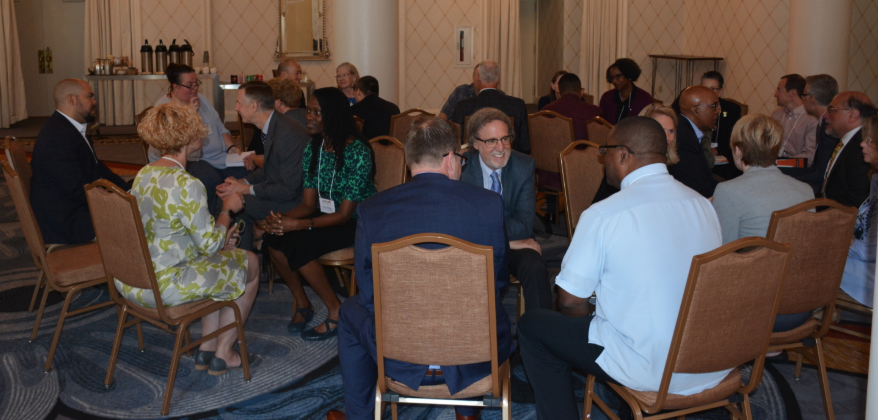
New Deans "Speed Dating" Acitivity
|
Prior to the start of the full meeting, a special session was held for new deans, including a panel discussion featuring Joyce Alexander (Texas A&M University), AERA Executive Director Felice J. Levine, AERA-CURI Executive Committee Chair Kathryn Chval (University of Missouri), Glenn Good (University of Florida), and Valerie Kinloch (University of Pittsburgh) on the challenges and opportunities facing deans at colleges of education. The session also included a “speed dating” networking activity in which new deans were paired with experienced deans, offering new deans the opportunity to ask their veteran colleagues questions and to learn about innovative ideas, initiatives, and resources that have been successful at other institutions.
|
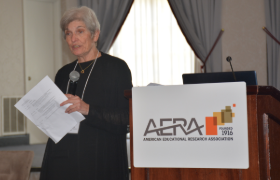
AERA Executive Director
Felice J. Levine
|
The full meeting kicked off with brief welcoming remarks from Levine and Chval, who provided an overview of the meeting designed to frame the substance and significance of planned sessions and group activities.
Chval then initiated small group discussions designed for AERA-CURI members to think about advancing education research from their perspectives as institutional leaders. Topics for discussion included supporting faculty research in obtaining external funding, maintaining a culture that retains scholars of color, establishing and sustaining research-practice partnerships, assisting faculty in turning their scholarship into revenue-generating entities, among others.
|
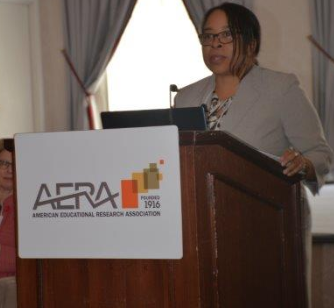
Kimberly Mealy (American Political
Science Association)
|
Later that afternoon, attendees participated in a session titled “Harassing and Unwelcoming Conduct—Strategies for Culture Change.” This session featured Joyce Alexander (Texas A&M University) as the moderator, and Frazier Benya (National Academies of Science, Engineering, and Medicine), Jamie Lewis Keith (Education Counsel), and Kimberly Mealy (American Political Science Association) served as panelists.
Throughout the session, panelists drew on the findings and implications of the 2018 National Academies report, Sexual Harassment of Women: Climate, Culture, and Consequences in Academic Sciences, Engineering, and Medicine, which calls for sweeping changes in the culture and climate of higher education as well as significant improvements in the way women are treated in the academy and scholarly professions—especially the sciences.
|
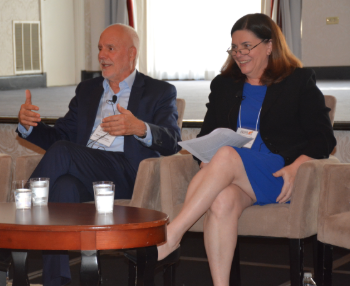
(Left to Right): IES Director Mark Schneider
and Kathryn Chval (University of Missouri)
|
The day also featured a session on “Institute of Education Sciences (IES) Aspirations and Interest in Research Community Input and Engagement.” AERA-CURI members learned about policy updates and prospective initiatives from Mark Schneider, director of IES, who also provided an update on changes that were made to the IES FY 2020 Requests for Applications and potential changes to the FY 2021 Competition.
The second day of the meeting began with small group discussions and a planning conversation on “Open Science and Valuing Diverse Forms of Scholarly Productivity.” Levine opened the conversation with an overview of the activities AERA has undertaken on this issue and collaborations with the broader scientific community. Levine also underscored the importance of working with funders to invest in cumulative programs of research and in the tools and data to make the sciences vital, the unity and connectedness of the sciences, and the need to fully embrace communication with diverse publics.
Joining this session as co-facilitator was Suzanne Ortega, president of the Council of Graduate Schools (CGS). AERA and CGS recently received a grant from the National Science Foundation to convene higher education and research leaders to advance academic support for open science.
|
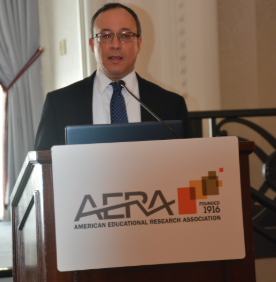
Evan Heit, division director of the
Division of Research on Learning
in the NSF Education & Human
Resources Directorate
|
Attendees also participated in a session called “Big Ideas and Big Emphases at the National Science Foundation’s Education and Human Resources Directorate.” This session was moderated by Fouad Abd-El-Khalick, dean and professor in the College of Education at the University of North Carolina-Chapel Hill, and Evan Heit, division director of the Division of Research on Learning (DRL) in the NSF Education & Human Resources (EHR) Directorate, served as a panelist. Heit provided updates about several of the NSF 10 Big Ideas where EHR is playing a leading role–NSF INCLUDES and the Future of Work at the Human-Technology Frontier.
In the final session of the meeting, Na’ilah Suad Nasir, president of the Spencer Foundation, discussed a new path forward for education research with AERA-CURI members. Nasir made several recommendations during her talk, including activating equitable education spaces to allow for additional time for researchers to think and work collaboratively and breaking down silos through engaged research. She also noted that education researchers want their research to matter but that the disconnect between research and policy and practice needs to be addressed.
|
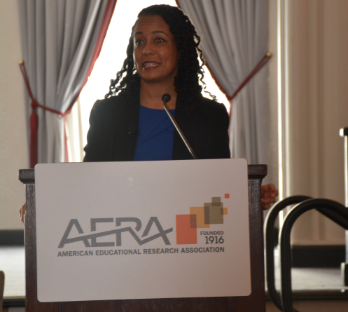
Spencer Foundation President
Na’ilah Suad Nasir
|
The meeting concluded with several AERA-CURI members visiting congressional offices to discuss the use of and support for education research on Capitol Hill.
AERA-CURI member institutions (1) examine and collaborate on emerging and persisting issues associated with their research missions, (2) facilitate their engagement in AERA's education and advocacy efforts to promote federal research support and sound research policies, and (3) enhance collaborative efforts among individual scholars within AERA and the academic and research institutions of which they are a part. To learn more about AERA-CURI, click here.